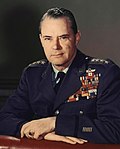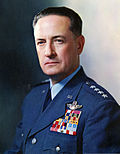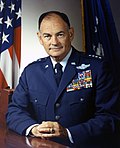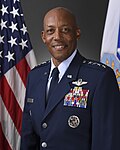| No. | Portrait | Name | Term | Background | Secretaries served under: | Ref. |
|---|
| Took office | Left office | Duration | Air Force | Defense |
|---|
| 1 | | Spaatz, Carl AndrewGeneral
Carl A. Spaatz
(1891–1974) | 26 September 1947 | 29 April 1948 | 216 days | Fighters | Stuart Symington | James Forrestal | [7] |
| 2 | | Vandenberg, Hoyt SanfordGeneral
Hoyt S. Vandenberg
(1899–1954) | 30 April 1948 [a] | 29 June 1953 | 5 years, 60 days | Attack and Fighters | Stuart Symington
Thomas K. Finletter
Harold E. Talbott | James Forrestal
Louis A. Johnson
George C. Marshall
Robert A. Lovett
Charles Erwin Wilson | [7] |
| 3 | | Twining, Nathan FarragutGeneral
Nathan F. Twining
(1897–1982) | 30 June 1953 [a] | 30 June 1957 [b] | 4 years, 0 days | Fighters and Bombers | Harold E. Talbott
Donald A. Quarles
James H. Douglas Jr. | Charles Erwin Wilson | [7] |
| 4 | | White, Thomas DresserGeneral
Thomas D. White
(1901–1965) | 1 July 1957 [a] | 30 June 1961 | 3 years, 364 days | Observation aircraft and Staff | James H. Douglas Jr.
Dudley Sharp
Eugene Zuckert | Charles Erwin Wilson
Neil H. McElroy
Thomas Gates
Robert McNamara | [7] |
| 5 | | LeMay, Curtis EmersonGeneral
Curtis E. LeMay
(1906–1990) | 30 June 1961 [a] | 31 January 1965 | 3 years, 215 days | Bombers | Eugene Zuckert | Robert McNamara | [7] |
| 6 | | McConnell, John PaulGeneral
John P. McConnell
(1908–1986) | 1 February 1965 [a] | 31 July 1969 | 4 years, 180 days | Fighters | Eugene Zuckert
Harold Brown
Robert Seamans | Robert McNamara
Clark Clifford
Melvin Laird | [7] |
| 7 | | Ryan, John DaleGeneral
John D. Ryan
(1915–1983) | 1 August 1969 [a] | 31 July 1973 | 3 years, 364 days | Bombers | Robert Seamans
John L. McLucas | Melvin Laird
Elliot Richardson
James R. Schlesinger | [7] |
| 8 | | Brown, George ScratchleyGeneral
George S. Brown
(1918–1978) | 1 August 1973 | 30 June 1974 [b] | 333 days | Bombers | John L. McLucas | James R. Schlesinger | [7] |
| 9 | | Jones, David CharlesGeneral
David C. Jones
(1921–2013) | 1 July 1974 | 20 June 1978 [b] | 3 years, 354 days | Bombers | John L. McLucas
Thomas C. Reed
John C. Stetson | James R. Schlesinger
Donald Rumsfeld
Harold Brown | [7] |
| 10 | | Allen, LewGeneral
Lew Allen Jr.
(1925–2010) | 1 July 1978 [a] | 30 June 1982 | 3 years, 364 days | Bombers | John C. Stetson
Hans Mark
Verne Orr | Harold Brown
Caspar Weinberger | [7] |
| 11 | | Gabriel, Charles AlvinGeneral
Charles A. Gabriel
(1928–2003) | 1 July 1982 | 30 June 1986 | 3 years, 364 days | Fighters | Verne Orr
Russell A. Rourke
Edward Aldridge | Caspar Weinberger | [7] |
| 12 | | Welch, Larry D.General
Larry D. Welch
(born 1934) | 1 July 1986 | 30 June 1990 | 3 years, 364 days | Fighters | Edward Aldridge
Donald Rice | Caspar Weinberger
Frank Carlucci
Dick Cheney | [7] |
| 13 | | Dugan, Michael JosephGeneral
Michael J. Dugan
(born 1937) | 1 July 1990 | 17 September 1990
(relieved) | 78 days | Fighters | Donald Rice | Dick Cheney | [7] |
| – | | Loh, John MichaelGeneral
John M. Loh
(born 1938)
Acting
[c] | 18 September 1990 | 29 October 1990 | 41 days | Fighters | Donald Rice | Dick Cheney | [7] |
| 14 | | McPeak, Merrill AnthonyGeneral
Merrill A. McPeak
(born 1936) | 30 October 1990 | 25 October 1994 | 3 years, 360 days | Fighters | Donald Rice
Sheila Widnall | Dick Cheney
Les Aspin
William J. Perry | [7] |
| 15 | | Fogleman, Ronald RobertGeneral
Ronald R. Fogleman
(born 1942) | 26 October 1994 | 1 September 1997 | 2 years, 310 days | Fighters | Sheila Widnall | William J. Perry
William Cohen | [7] |
| – | | Eberhart, Ralph EdwardGeneral
Ralph E. Eberhart
(born 1946)
Acting
[c] | 2 September 1997 | 5 October 1997 | 33 days | Fighters | Sheila Widnall | William Cohen | [7] |
| 16 | | Ryan, MichaelGeneral
Michael E. Ryan
(born 1941) | 6 October 1997 | 5 September 2001 | 3 years, 334 days | Fighters | Sheila Widnall
F. Whitten Peters
James G. Roche | William Cohen
Donald Rumsfeld | [7] |
| 17 | | Jumper, John PhillipGeneral
John P. Jumper
(born 1945) | 6 September 2001 | 1 September 2005 | 3 years, 360 days | Fighters | James G. Roche | Donald Rumsfeld | [7] |
| 18 | | Moseley, Teed MichaelGeneral
T. Michael Moseley
(born 1949) | 2 September 2005 [a] | 11 July 2008
(resigned) | 2 years, 344 days | Fighters | Michael Wynne | Donald Rumsfeld
Robert Gates | [8] |
| – | | McNabb, DuncanGeneral
Duncan J. McNabb
(born 1952)
Acting
[c] | 12 July 2008 | 12 August 2008 | 31 days | Airlift | Michael B. Donley | Robert Gates | [8] |
| 19 | | Schwartz, Norton AllanGeneral
Norton A. Schwartz
(born 1951) | 12 August 2008 | 10 August 2012 | 3 years, 364 days | Airlift and Special Operations aircraft | Michael B. Donley | Robert Gates
Leon Panetta | [9] |
| 20 | | Welsh, Mark Anthony IIIGeneral
Mark A. Welsh III
(born 1953) | 10 August 2012 | 24 June 2016 | 3 years, 319 days | Attack and Fighters | Michael B. Donley
Deborah Lee James | Leon Panetta
Chuck Hagel
Ash Carter | [10] |
| 21 | | Goldfein, David LeeGeneral
David L. Goldfein
(born 1959) | 1 July 2016 [a] | 6 August 2020 | 4 years, 36 days | Fighters | Deborah Lee James
Heather Wilson
Barbara Barrett | Ash Carter
Jim Mattis
Mark Esper | [11] |
| 22 | | Brown, Charles Quinton Jr.General
Charles Q. Brown Jr.
(born 1962) | 6 August 2020 | 29 September 2023 [b] | 3 years, 54 days | Fighters | Barbara Barrett
Frank Kendall III | Mark Esper
Lloyd Austin | [12] |
| – [c] |  | General
David W. Allvin
(born 1963) | 29 September 2023 | 2 November 2023 | 34 days | Airlift | Frank Kendall III
Troy Meink | Lloyd Austin
Pete Hegseth | [13] |
| 23 | 2 November 2023 | 3 November 2025 | 2 years, 1 day | [14] |
| 24 | | Wilsbach, Kenneth StephenGeneral
Kenneth S. Wilsbach
(born c. 1963) | 3 November 2025 | Incumbent | 11 days | Fighters | Troy Meink | Pete Hegseth | [15] [16] |


































